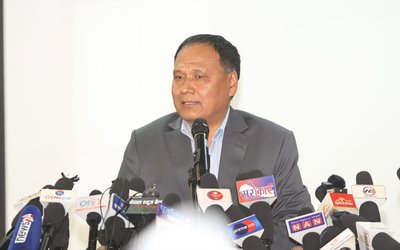
Weakening state institutions one after another in the last eight years, Nepal’s political leaders have been, knowingly or unknowingly, working to destabilize the Nepalese Army.
Although Nepal Army reacted promptly on the provisions proposed in the New Constitution on formation of Security Council, leaders of major political parties, including prime minister Sushil Koirala, paid no heed to this.
When the president and prime minister and defense minister did not come to protect their interests in the constitution, Nepal Army jumped in, seeking justice in the constitution.
Concerned over the proposed provisions concerning the army in the draft constitution, the NA held interactions on these provisions with divisional commanders. Earlier, the NA leadership held interactions with the generals to seek their feedback on the draft provisions.
A strong organized force of over 90,000, Nepal Army saw its recent compulsion to seek it a safer place may set a bad tradition in the long run. As leaders of three political parties are in no mood to listen other voices, it is likely that they will ignore Nepal Army’s stands.
As Nepal Army has started to lobby for its interests, one cannot imagine the outcome in case the political leaders cannot fulfill these. With the transformation of Nepal as a Republican state with weak president, Nepal Army is now lobbying for itself as there is no one to lobby for its interests.
During the constitution writing in 1990, Nepal Army’s general called on then prime minister Krishna Prasad Bhattarai and proposed its views on the proposed system.
Nepal Army (NA) has expressed strong reservations over some provisions relating to the national army in the draft constitution.
Chief of Army Staff (CoAS) Gaurav SJB Rana has formally set out the army's reservations over some of the provisions, in the form of suggestions submitted to Prime Minister Sushil Koirala and President Dr Ram Baran Yadav.
The NA has demanded that the Chief of Army Staff (CoAS) should be made a member of the National Security Council (NSC). As per the provisions in the draft constitution, the prime minister heads the NSC while the defense, home, finance and foreign ministers act as its members.
Arguing that the roles, responsibilities and functions of the NA have become more important and more sensitive in terms of national security as the country goes for a federal structure.
Likewise, the NA has maintained that since decisions on the recruitment, appointment and promotion of army personnel are made through the Nepal Army Act, there is no need to involve the Public Service Commission (PSC) in these decisions. The draft constitution has proposed to make all appointments and promotions of army personnel through the PSC.
The NA has also demanded that the appointment of the CoAS be made through the president at the recommendation of the council of ministers. The draft constitution has a provision on appointing the CoAS and relieving him of the post as per the existing laws.
The NA has also maintained that NA personnel should not fall under the jurisdiction of the Commission for Investigation of Abuse of Authority (CIAA) as they are already liable to strong punishment in accordance with the Army Act.
With the recent moves of Ministry of Home Affairs and Deputy Prime Minister Bam Dev Gautam to create divisions between Nepal Police and Nepal Armed Police, there is a very slim possibility to change the current provision in the draft in the present constitution.
Whatever one may think of getting from destabilizing Nepal Army for a short gain, the destabilization of Nepal Army with more than 250 years long tradition will have broader implications in Nepal and beyond the borders.
- IME GROUP: Expands Into Paper Industry
- Mar 24, 2025
- CPN UML: Instigated By India
- Mar 23, 2025
- ADB’S CHIEF ECONOMIST: Nepal Reduces Poverty
- Mar 11, 2025
- FM DR. DEUBA: A Successful Visit
- Mar 11, 2025
- MD GHISING: Target Of Personal Grudge
- Mar 09, 2025















